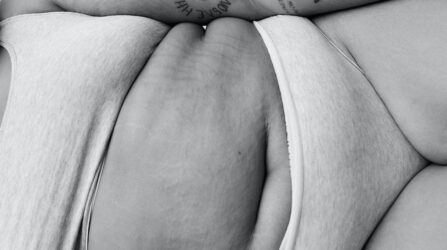Hormona Library
Our Library is packed with personal stories and in-depth research-
based features, alongside the latest medical and scientific discoveries
in the worlds of hormone and reproductive health.
[wpcode id="56456"]
Our Library is packed with personal stories and in-depth research-
based features, alongside the latest medical and scientific discoveries
in the worlds of hormone and reproductive health.

Understanding the female libido Before we can answer, “Does progesterone increase sex drive?” it’s important to gain a better understanding of what a “sex drive” means. The female libido or sex drive is how much you desire sexual activity. Every

Why am I so hungry before my period? Women who experience an increased appetite before period starts can feel frustrated that they’re craving foods they don’t normally eat. You may be wondering, “Why do I eat so much before my

Understanding cycle syncing workouts Did you know that evidence shows a link between the impact of exercise and menstrual cycle phases in women? It’s true. Women are at a higher risk of foot and ankle injury during workouts than men,

What is ovulation nausea? Ovulation is when the dominant follicle in your ovaries releases an egg that travels to the uterus for fertilization. During this time of your menstrual cycle, your hormone levels fluctuate, with a surge in luteinizing hormone

What causes weight gain in perimenopause? If you’re beginning to see signs that you’re entering the menopause transition, you may wonder, “Can perimenopause cause weight gain?” The short answer is, “Yes,” weight gain and perimenopause are often tied together. But

What are menopause hormone levels? Menopause is 12 consecutive months without a period. It’s the final stage of perimenopause, which begins around age 46 and can last ten or more years. During perimenopause, your ovaries release eggs less frequently, and

At what age does perimenopause start? Perimenopause is a normal part of a woman’s reproductive cycle, where you transition out of your peak reproductive years into menopause. It is caused by ovarian aging, during which the number of follicles decreases

What is the last stage of perimenopause? The last stage of perimenopause is menopause and is marked by 12 consecutive months without a period. During perimenopause, your sex hormone levels like estrogen and progesterone start to decrease, causing ovulation to

What age does perimenopause typically start? As women, our menstrual cycle plays a large role in our lives. During our peak reproductive years, our ovaries release an egg every month, which is either fertilized, resulting in pregnancy, or disintegrated in

Why do women experience perimenopause symptoms? Perimenopause is a natural stage in a woman’s life when the ovaries become less responsive to brain signals, leading to significant fluctuations in estrogen and progesterone levels, which drop right before the final period.

What does spotting before your period look like? Spotting is a few drops of blood on your underwear that are not enough to soak a pad. It’s typically brown, light pink, or red and may only be noticeable on a

Postpartum hormonal changes: What are they? Postpartum hormonal changes occur when your body experiences shifting hormone levels after birth. After your baby is born, the doctor removes the afterbirth or placenta, which sends signals to your body that you’re no

What is ovulation fatigue? As women, we can get numerous symptoms throughout our menstrual cycles. One question we’re asked is, “Why do you get tired during ovulation?” For some, the answer could be ovulation fatigue. Ovulation fatigue is when you

The benefits of a hormone-balancing diet While being on a diet to regulate hormones may not sound like fun at first, once you begin seeing the benefits, you’ll wonder why you waited so long to start. As women, our bodies

What is an LH surge? If you’re tracking your hormones, you’ve probably noticed a drastic increase in your LH levels around the middle of the month, near the time you ovulate. It may make you wonder,” Why is my LH

Receiving the news that you have breast cancer can be devastating. Having your world turned upside down means learning to live with a new normal as you fight this horrible disease. While breast cancer is the most common type of

When do you ovulate after giving birth? The postpartum whirlwind can make life extra hectic, and it’s easy to lose track of where you are in your menstrual cycle. Just like every woman is unique, so is the healing period

What is considered a short luteal phase? As we discussed earlier, there are two phases of the menstrual cycle, each playing a key role in your reproductive health. The luteal phase is especially important for anyone trying to conceive since

What is hormone imbalance? Before we discuss what a hormone imbalance is, it’s important to go over what hormones are and where they come from. As we discussed above, hormones are chemical messengers that tell your tissues and organs what

What is ovulation cramping? If you’ve ever noticed a dull ache on one side of your lower abdomen about 14 before your period, you probably experienced ovulation cramping. This discomfort occurs as the follicles rupture, releasing a mature egg. It

What is estradiol? Estradiol is a type of estrogen that’s produced primarily from the ovaries but in lesser amounts by the adrenal glands and fatty tissue. As one of the primary sex hormones, it plays a key role in regulating

What is ovulation bleeding? Ovulation bleeding is a slight vaginal bleeding that happens when your ovary releases an egg, a process called ovulation. Also known as mid-cycle bleeding, it generally occurs in the middle of your menstrual cycle at the

Optimal levels of progesterone Progesterone is mainly produced by the ovaries in high amounts after ovulation. This hormone is essential for supporting conception and the development of pregnancy. All that is needed is ovulation to achieve the expected levels of

How do you know when your ovulation is over? Ovulation is a key part of a woman’s menstrual cycle, but what is it, and what are the signs you already ovulated? The first step is understanding how ovulation occurs and

What is anovulation? As we discussed earlier, anovulation is when the ovaries fail to release a mature egg during the menstrual cycle. Many women experience at least one anovulatory period during their lifetime, but if you chronically have no ovulation

Does ovulation make you more horny? When considering the question, “Does ovulating make you horny?” the answer comes from the body’s biological functions during the menstrual cycle. As we touched on earlier, there are two phases in a woman’s menstrual

What is estrogen dominance? As a woman, you’ve probably heard how important female sex hormones are to your reproductive system. Estrogen and progesterone, the two main hormones, help regulate your menstrual cycle and keep it functioning smoothly. The female body

What is hormone replacement therapy (HRT)? Hormone replacement therapy (HRT) for women is a treatment that supplements or replaces declining hormone levels. Typically, HRT is given to manage menopausal symptoms, like vaginal dryness, hot flashes, decreased sex drive, and mood

What is ovulation bleeding? Spotting or bleeding at any time other than your period can be scary and confusing, but it doesn’t always mean there’s something wrong. To better understand why you may experience ovulation bleeding, it’s important to quickly

It must be that time of the month again…or is it? Wait, didn’t I just get my period a couple of weeks ago? So, why am I so bloated? While most of us expect to feel bloated during our period,
Hormona© 2025, All Rights Reserved
Privacy Overview
| Cookie | Duration | Description |
|---|---|---|
| cookielawinfo-checkbox-analytics | 11 months | This cookie is set by GDPR Cookie Consent plugin. The cookie is used to store the user consent for the cookies in the category "Analytics". |
| cookielawinfo-checkbox-functional | 11 months | The cookie is set by GDPR cookie consent to record the user consent for the cookies in the category "Functional". |
| cookielawinfo-checkbox-necessary | 11 months | This cookie is set by GDPR Cookie Consent plugin. The cookies is used to store the user consent for the cookies in the category "Necessary". |
| cookielawinfo-checkbox-others | 11 months | This cookie is set by GDPR Cookie Consent plugin. The cookie is used to store the user consent for the cookies in the category "Other. |
| cookielawinfo-checkbox-performance | 11 months | This cookie is set by GDPR Cookie Consent plugin. The cookie is used to store the user consent for the cookies in the category "Performance". |
| viewed_cookie_policy | 11 months | The cookie is set by the GDPR Cookie Consent plugin and is used to store whether or not user has consented to the use of cookies. It does not store any personal data. |
